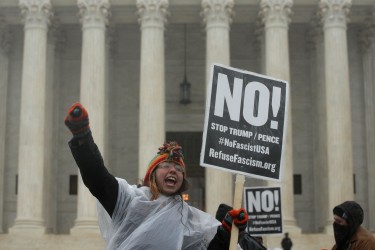Is Donald Trump a fascist?
That question emerged in various forms pretty early in his 2016 presidential campaign, which began with a speech railing against Mexican immigrants, and gained steam after he called for a “total and complete shutdown of Muslims entering the United States” in December 2015, as a response to the San Bernardino terrorist attack.
At that point, the Muslim ban proposal, I contacted five fascism experts and asked them if Trump qualified. They all said no. Every one of them stated that to be a fascist, one must support the revolutionary, usually violent overthrow of the entire government/Constitution, and reject democracy entirely. In 2015, none were comfortable saying Trump went that far. He was too individualist for the inherently collectivist philosophy of fascism, and not sufficiently committed to the belief that violence is good for its own sake, as a vital cleansing force.
Roger Griffin, the author of The Nature of Fascism and a professor of history at Oxford Brookes University, summed it up well: “You can be a total xenophobic racist male chauvinist bastard and still not be a fascist.”
Five years have now passed, and the fascism questions have only grown more frequent. Trump has had time to implement quite anti-immigrant and anti-Black policies, and refused to denounce his most extreme and violent supporters, from the neo-Nazis and white nationalists in Charlottesville to the Proud Boys group. And every week, I receive dozens of emails from readers wondering if I stand by my conclusion in 2015, that Trump is simply a bigot with an authoritarian streak, not a fascist.
So I reached out to the experts I talked to back then. Four of the five replied, and I also got in touch with a few more scholars who have researched fascism to get a broader view.
The responses were, again, unanimous, albeit tinged with much greater concern about Trump’s authoritarian and violent tendencies. No one thinks Trump is a fascist leader, full stop. Jason Stanley, a Yale philosopher and author of How Fascism Works, came closest to that conclusion, saying that “you could call legitimately call Trumpism a fascist social and political movement” and that Trump is “using fascist political tactics,” but that Trump isn’t necessarily leading a fascist government.
But most experts did not even go that far, and some expressed concern that describing Trump as a fascist undermines the term and leads to a misanalysis of our current political situation. “If Trump was a fascist and we were in a situation akin to Germany in 1932 or Italy in 1921, certain kinds of actions would be justified,” Sheri Berman, a professor of political science at Barnard College, says. “But we are not and they are not.”













